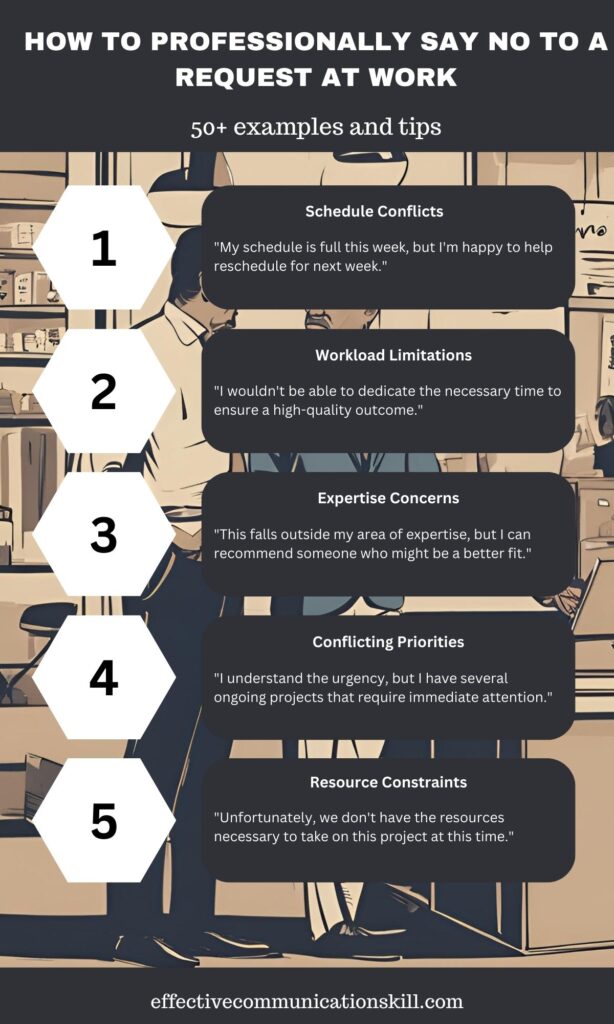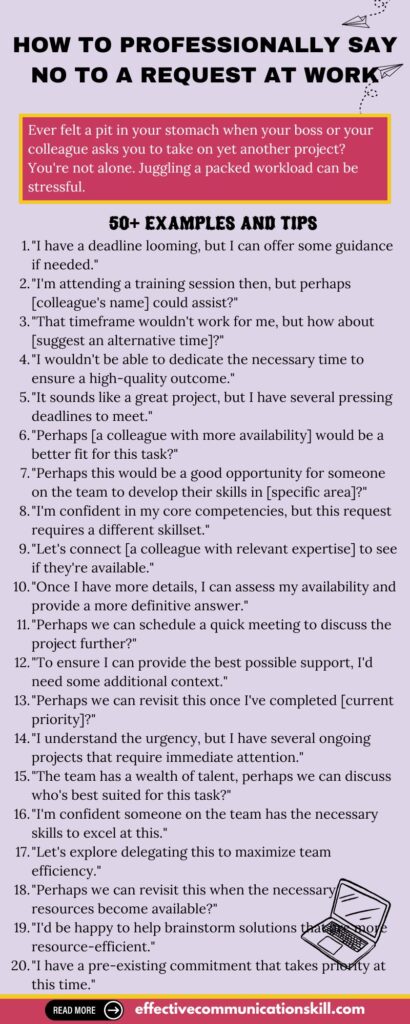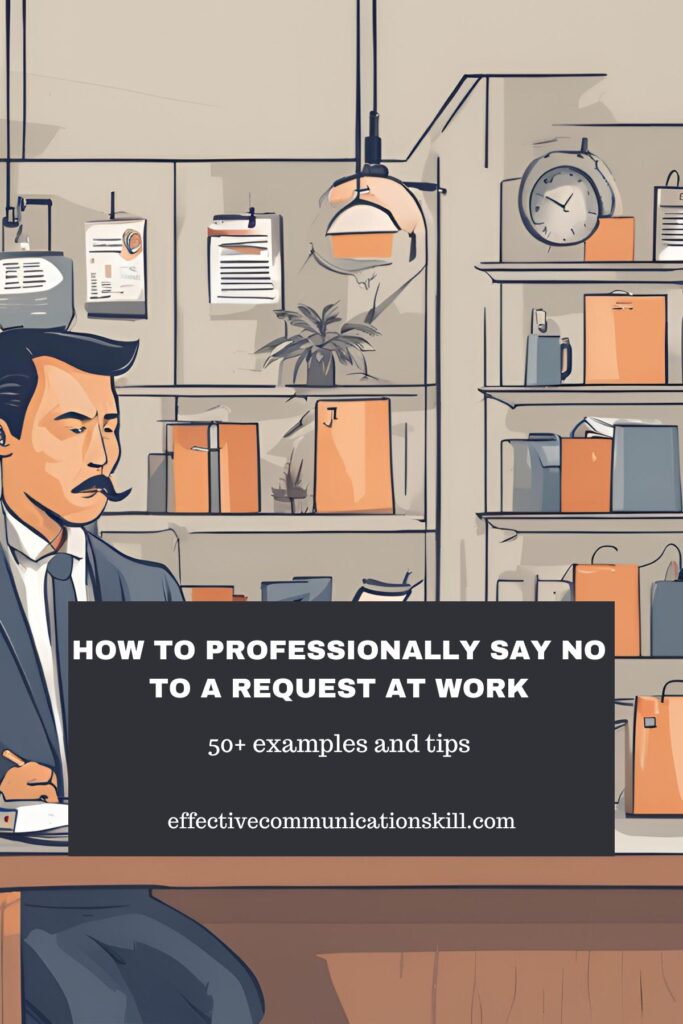How to Professionally Say No to a Request
Ever felt a pit in your stomach when your boss or your colleague asks you to take on yet another project? You’re not alone. Juggling a packed workload can be stressful, and saying no to additional requests can feel tricky.
But research shows that constantly saying yes can have negative consequences. According to the Forbes Coaches Council (2022), Saying “no” at work is important for professionals to avoid burnout, maintain productivity, and protect their mental health and well-being.
The good news? Mastering the art of professionally declining requests is an achievable skill that benefits you and your team. This guide equips you with effective strategies and versatile phrases to navigate these situations confidently, while maintaining positive working relationships.

How to Professionally Say No to a Request?
There are five key tips to follow when politely or professionally declining a request:
- Acknowledge and Appreciate: Begin by thanking the person for thinking of you and acknowledging the importance of their request.
Example: “Thank you for reaching out and trusting me with this project.”
- Explain Your Limits: Briefly explain why you cannot take on the request. Be honest and transparent about your current workload or commitments.
Example: “Unfortunately, my current deadlines wouldn’t allow me to dedicate the necessary time to this project.”
- Offer an Alternative: If possible, suggest an alternative solution or offer to help in a different way.
Example: “I can’t take on the entire project, but I’d be happy to connect you with a colleague who might be a better fit.”
- Maintain a Positive Tone: End on a positive note, reiterating your willingness to help in the future.
Example: “I wish I could be of more assistance this time. Please don’t hesitate to reach out if you have any other questions.”
- Follow Up (Optional): If appropriate, follow up with the person after some time has passed to show your continued interest in supporting their work.
50+ Ways to Professionally Say No to a Request
Here’s a comprehensive list of phrases categorized by scenario, allowing you to tailor your response to the specific situation:
Schedule Conflicts
- “I have a prior commitment at that time.”
- “My schedule is full this week, but I’m happy to help reschedule for next week.”
- “Unfortunately, I’m already booked for meetings throughout the day.”
- “I have a deadline looming, but I can offer some guidance if needed.”
- “I’m attending a training session then, but perhaps [colleague’s name] could assist?”
- “That timeframe wouldn’t work for me, but how about [suggest an alternative time]?”
Workload Limitations
- “My current workload wouldn’t allow me to take on this additional task.”
- “I’m at capacity right now, but I can revisit this in a few weeks.”
- “Taking on this would require additional resources that aren’t currently available.”
- “I wouldn’t be able to dedicate the necessary time to ensure a high-quality outcome.”
- “It sounds like a great project, but I have several pressing deadlines to meet.”
- “Perhaps [a colleague with more availability] would be a better fit for this task?”

Expertise Concerns
- “This falls outside my area of expertise, but I can recommend someone who might be a better fit.”
- “I wouldn’t feel comfortable taking this on without more experience in [specific area].”
- “While I’m happy to help, I don’t have the specialized knowledge required for this task.”
- “Perhaps this would be a good opportunity for someone on the team to develop their skills in [specific area]?”
- “I’m confident in my core competencies, but this request requires a different skillset.”
- “Let’s connect [a colleague with relevant expertise] to see if they’re available.”
Interesting to know? HOW TO PROFESSIONALLY SAY NO TO YOUR BOSS? (50+ POLITE EXAMPLES AND TIPS)
Unclear Request Parameters
- “I’d be happy to help, but I need more information about the scope of the request.”
- “Could you clarify the specific deliverables and deadlines for this project?”
- “Without a clearer understanding of the expectations, I can’t commit at this time.”
- “Once I have more details, I can assess my availability and provide a more definitive answer.”
- “Perhaps we can schedule a quick meeting to discuss the project further?”
- “To ensure I can provide the best possible support, I’d need some additional context.”
Conflicting Priorities
- “I have a pre-existing commitment that takes priority at this time.”
- “Unfortunately, this request conflicts with another urgent deadline.”
- “My current priorities wouldn’t allow me to dedicate the necessary focus to this task.”
- “Perhaps we can revisit this once I’ve completed [current priority]?”
- “I understand the urgency, but I have several ongoing projects that require immediate attention.”
Delegation Opportunities
- “This task might be a good learning experience for [team member seeking development].”
- “Delegating this would allow me to focus on my core responsibilities, but I’m happy to oversee the process.”
- “The team has a wealth of talent, perhaps we can discuss who’s best suited for this task?”
- “I’m confident someone on the team has the necessary skills to excel at this.”
- “Let’s explore delegating this to maximize team efficiency.”
Resource Constraints
- “Unfortunately, we don’t have the resources necessary to take on this project at this time.”
- “This request would require additional resources that are currently unavailable.”
- “It would be beneficial to explore the resource requirements before committing.”
- “Perhaps we can revisit this when the necessary resources become available?”
- “I’d be happy to help brainstorm solutions that are more resource-efficient.”
Company Policy Considerations
- “It appears this request might conflict with company policy on [relevant policy].”
- “I’d be happy to help you navigate the company’s policies regarding this request.”
- “Let’s consult with [HR department] to ensure we’re on the right track.”
- “It would be beneficial to ensure this request aligns with company policies before proceeding.”
- “I’m happy to champion this request if it receives approval from the appropriate channels.”
Future Availability
- “I wouldn’t be able to take this on right now, but I’d be happy to help in a few weeks.”
- “My schedule is full at the moment, but keep me in mind for future projects.”
- “While I can’t commit today, let’s revisit this closer to the deadline.”
- “I appreciate you thinking of me, and I’ll be sure to let you know if my availability changes.”
Offering Alternatives
- “I can’t take on the entire project, but I’d be happy to contribute to a specific aspect.”
- “While I’m unavailable to lead this, perhaps I can offer some suggestions or feedback.”
- “This might be a good opportunity to explore a different approach. Would you be open to discussing alternatives?”
- “I can’t commit to the original deadline, but is there any flexibility on the timeframe?”

Conclusion
Remember, the key to professionally declining a request is clear communication, respect, and a willingness to find solutions whenever possible. By using these phrases and tailoring them to your specific situation, you can navigate these conversations confidently and maintain positive working relationships.
